Mark Zuckerberg Loses $7 Billion
An ad boycott has the Facebook co-founder down to his last $82.3 billion.
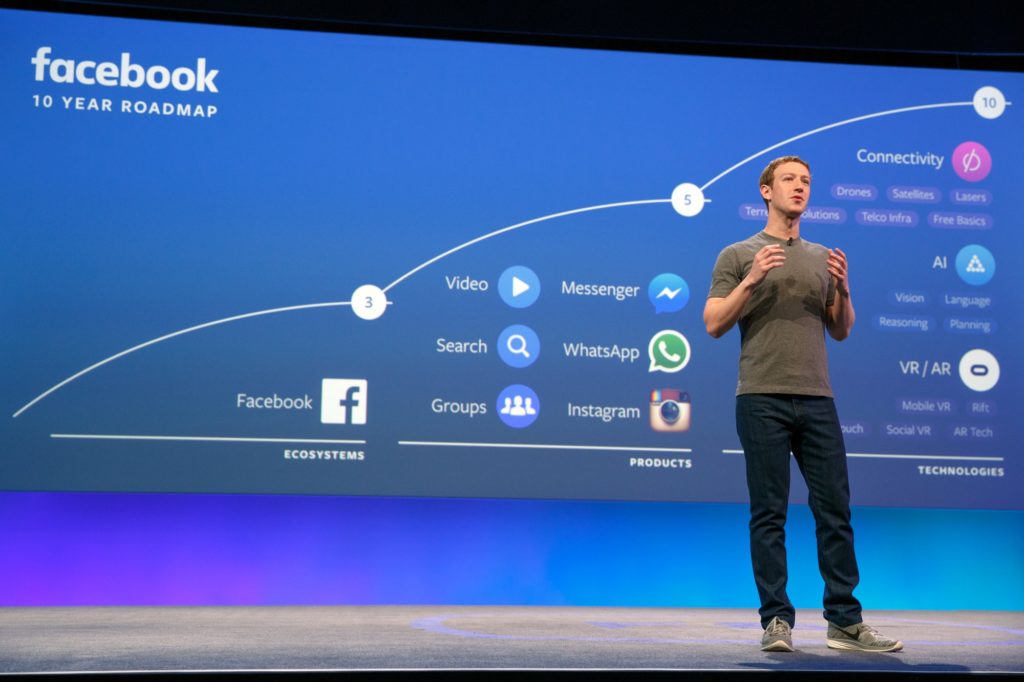
Longtime Senator Everett Dirksen famously joked about federal spending, “A billion here, a billion there, and pretty soon you’re talking real money.” A #BlackLivesMatter-inspired boycott is starting to add up for the largest social media company and its most visible founder.
Bloomberg (“Zuckerberg Loses $7 Billion as Firms Boycott Facebook Ads“):
Mark Zuckerberg just became $7.2 billion poorer after a flurry of companies pulled advertising from Facebook Inc.’s network.
Shares of the social media company fell 8.3% on Friday, the most in three months, after Unilever, one of the world’s largest advertisers, joined other brands in boycotting ads on the social network. Unilever said it would stop spending money with Facebook’s properties this year.
The share-price drop eliminated $56 billion from Facebook’s market value and pushed Zuckerberg’s net worth down to $82.3 billion, according to the Bloomberg Billionaires Index. That also moved the Facebook chief executive officer down one notch to fourth place, overtaken by Louis Vuitton boss Bernard Arnault, who was elevated to one of the world’s three richest people along with Jeff Bezos and Bill Gates.
That a company started by college kids the month after I launched OTB has lost $56 billion is staggering. That it’s still worth $216.08 billion, even more so.
I was briefly distracted by news that Louis Vuitton was worth even more than that but a bit of research told me that, no, that’s not right. Even though I’ve never heard of Arnault, he has briefly been the richest man in the world when there have been seismic shifts in tech stocks, but it’s because he inherited two massive companies and grew them. “Louis Vuitton boss” is a weird way to describe him.
But I digress.
Companies from Verizon Communications Inc. to Hershey Co. have also stopped social media ads after critics said that Facebook has failed to sufficiently police hate speech and disinformation on the platform. Coca-Cola Co. said it would pause all paid advertising on all social media platforms for at least 30 days.
Zuckerberg responded Friday to the growing criticism about misinformation on the site, announcing the company would label all voting-related posts with a link encouraging users to look at its new voter information hub. Facebook also expanded its definition of prohibited hate speech, adding a clause saying no ads will be allowed if they label another demographic as dangerous.
“There are no exceptions for politicians in any of the policies I’m announcing here today,” Zuckerberg said.
Last Monday’s episode of the NYT podcast The Daily, “How Facebook Is Undermining ‘Black Lives Matter’,” was an excellent primer on the issue, contrasting the companies position on policing content with that of Twitter. Essentially, while both companies have liberal bosses and even more liberal employees, Twitter’s customer base is much younger and more progressive while Facebook’s is older and more conservative.
Ironically, while Republicans on Facebook think the platform is left-wing and constantly suppressing conservative voices, the opposite is true. Indeed, the most-shared stories on any given day are going to be overwhelmingly pro-Trump.
While Twitter actively—but not actively enough for many—takes down hate speech and misinformation, Facebook has been relatively laissez faire.
NYT reporter Kevin Roose argued in the episode that both companies could do more:
Well, there’s plenty of things that they could do to kind of take down the temperature of the overall conversation on their platforms. They could change the way that their systems rank information. So instead of showing you the stuff that is most engaging, they could more heavily curate the information that comes onto people’s feeds.
They could put a cap on like how viral posts can go to sort of keep bad actors from hijacking these conversations and undermining these movements. There’s a lot that they could tweak about the basic structures of their platforms. But that could cut pretty deeply into their business models.
And ultimately, like, I think the bigger thing that they’re realizing is that they have to pick a side. There is no such thing as a neutral platform. And all these decisions that they make about how their tools are designed, how they’re used, what policies they have, they are all pushing in one direction or the other. And in this moment, this national moment of reckoning, of activism, of people speaking out against injustice, they have to decide whether that’s something that they want to support or whether they want to stand on the sidelines.
He notes, for example, that on the same day “Zuckerberg came out with this long, heartfelt Facebook post about how he supported Black Lives Matter, how Facebook was going to donate millions of dollars to racial justice causes, how he stood with Facebook’s black employees and with the movement for racial justice” the most viral video on the site featured Candace Owens claiming Black Lives Matter was a hoax.
So in my opinion, George Floyd was a criminal. He was a criminal. And just because he was a criminal doesn’t mean he deserved to die at the knee of a police officer. But it does mean that I am not going to play a part of the broken black culture that always wants to martyr criminals.
And there’s certainly no excuse to accept the democrat narrative, OK, that black people are being disproportionately hunted down by police officers because of the color of their skin.
Police brutality, racially-motivated police brutality is a myth.
It’s not just big companies who feel like they have to make a stand here under the pressure of these protests. Facebook is losing employees. So, Zuckerberg had to make some changes.
But I question how big those changes will be.
And, frankly, I’m not sure how long the companies in question will refrain from advertising on Facebook and Instagram (which Facebook owns).
Beyond that, I’m sympathetic to Zuckerberg’s position.
No, I don’t much care that he lost $7 billion. It’s absurd that he has that much money, let alone that he can lose that much money (the net worth of the 240th richest person on the planet!) and still be worth $82 billion. Indeed, to the extent that he’s losing money made spreading propaganda and falsehood, hooray.
And I’m sure not upset that he’s catching grief for being indifferent to malevolent foreign actors manipulating Facebook’s algorithms to sway American elections.
Still, it’s a bizarre notion, indeed, that it’s up to the executives at Facebook and Twitter to determine whether the words of the President of the United States should be allowed to appear on their platform and be shared by their users.
Beyond that, given the quasi-monopolistic status those companies have, I’m uncomfortable with their executives (much less their algorithms) being the arbiters of what constitutes truth. It’s one thing for the platform to prominently label a political advertisement as a political advertisement. It’s quite another for them to reject advertisements on the basis that they express points of view they deem impermissible.
So, for example, the clips from Candace Owens cited above are problematic. The degree to which “black people are being disproportionately hunted down by police officers because of the color of their skin” is a legitimate topic for debate. Indeed, the scholarly research on this question is mixed, owing to poor data availability and confounding variables. Yet, there’s simply no question that black and Hispanic communities feel threatened by police. Or that black and Hispanic men are much, much more likely to have interactions with police (itself a confounding variable). Or that there are a lot of racist cops patrolling our streets with a license to kill.
At the same time, Roose is right: neutrality isn’t really possible.
Anecdotally, my Twitter and Facebook experiences are wildly different. But, largely, that’s because of how I used the platforms. Twitter is among my go-to sources for news, particularly in the national security space, and I mostly follow scholars and practitioners in that space along with quite a few journalists. I started using Facebook to promote OTB posts but it evolved to mostly where I keep up with high school and Army friends as well as how I keep my late (first) wife’s family and friends up to date on what’s happening with the kids. So, my views are skewed by who I follow.
Still, while there’s plenty of viral nonsense on Twitter, I mostly see it getting smacked down by well-informed people, often legitimate experts in the field. By contrast, I see so much crap on Facebook that’s obvious bullshit but get tired of trying to debunk it because the people sharing it live in a fact-free zone.
With rare and obvious exceptions, I don’t think Zuckerberg should be in the business of deciding what ideas are allowed to be shared by his platform’s users. But I’d prefer if his business model wasn’t geared toward feeding people who enjoy right-wing bullshit more of it.

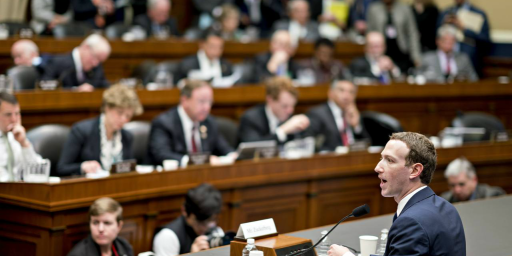
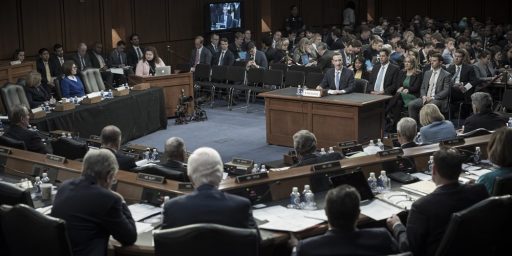
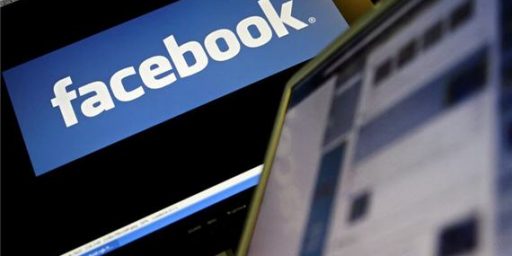
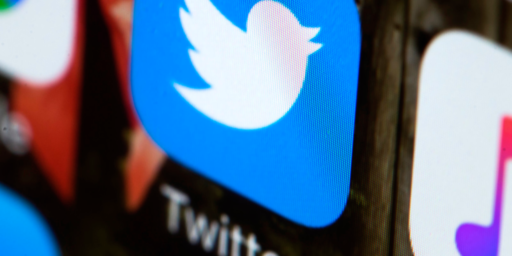
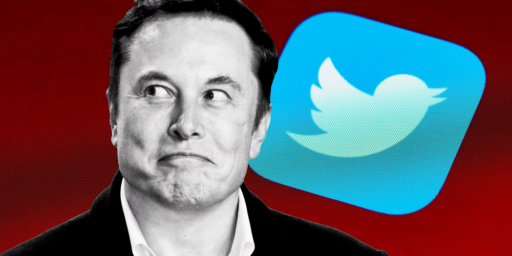
Frankly, this couldn’t happen to a nicer guy. But yes, the advertisers will return.
Monopoly is the problem with Facebook, multiplied by how easily the algorithm can be manipulated. The Orwellian world finally arrived and it has found a comfortable abode on Facebook, with accommodating second homes at Twitter and YouTube.
Is there a link to a GoFundMe to help keep him afloat? No Tech Barron should have to live this way.
I am not a twit and my face is not booked. But I read about this new ‘platform’ — is that the word you citizens of this strange new civilization use for these ‘things’? — for real TRUE conservatives called Parler. I guess if you want your anti-Semitism straight with no chaser that’s your destination these days.
Good luck.
@JohnMcC: The funny thing about Parler, somebody pointed out on Twitter the other day, is that you have a certain amount of points, and when you do racist stuff and people flag it, it costs you points, and if you lose all your points you can’t post or something, but you can buy more points from them. So you can keep doing more racist stuff. It’s like pay-as-you-go racism. 😀
When hiding behind free-speech and being irresponsible maximize their income, that’s what the tech Giants did. If being irresponsible is going to cost them some bucks, watch how fast they suddenly have deep concerns about our communities and will Take Action etc.
People say Facebook you’re like a newspaper you need to exercise editorial control on the content, and Facebook says no we’re the phone company we aren’t monitoring your content and you don’t want us to*, but the real metaphor should be like a restaurant. You’re not generally going to spy on what your diners are saying, but if you’re the manager at Burger King and a woman comes up to you and says hey that guy over there keep shouting he’s going to rape me, you kick that guy the fuck out.
*Minimizing their expenses and maximizing their profits, purely coincidental I am sure.
I try to keep my Facebook posts (and connections) as non-political as possible, hence the gardening pictures and links to science articles I find interesting. I’ve also been tracking good analyses of Brexit and Brazil coronavirus. I agree the last is somewhat morbid, but I consider Brazil to be a test case in “what will happen if the government deliberately doesn’t do anything about COVID-19 because the President is an acute imbecile”–a possible worst-case scenario for the U.S.
(Luckily I live in a Blue state with an intelligent governor and we’re gradually getting over the COVID-19 hump.)
Assumes facts not in evidence. Zuckerberg is a luckier Kushner, not a liberal and not a friend to liberals. He cares about $$ and supports Trump in every way that matters, from data mining to acting at his behest when it comes to propagating his lies and conspiracies.
Heh:
Pobrecito….
There is nothing bizarre about it at all, in fact it is at the very center of their business models and they have decided in favor of allowing this president to lie lie lie and spew whatever hateful and denigrating rhetoric he wants across their platforms, and they have done so for the sole reason of profit. One can call it free speech as much as one wants but it’s still shitting the bed and in my house it isn’t allowed.
Their morally bankrupt houses stink to high heaven.
@JohnMcC:
An article in The Bulwark pointed out that Parler really is a sewer. Among other things, at least six people have incorporated the word “ni**er” into their screen names.
Was it the founder of 8chan or 4chan or one of the chans who said that they were this kind of extreme free-speech person, then they saw that their creation became a forum of ghouls, and they’re like well that was a huge fucking mistake.
Well, I’m not sorry to see them sinking, but I think the reports of their death may be greatly exaggerated.
Facebook curates content. It may be done by “The Algorithm” but it’s still curation. That makes it responsible for what’s on its platform in a way that the company selling broadband to you isn’t.
These companies want to have it both ways. They want to curate for what brings them the most advertising bucks, but then want to take public stands in media about what they care about. And then claim neutrality.
I expect to see a balkanization – people gathering on smaller platforms each of which has a distinctive way in which they curate.
The APIs should be forced open. Email is open. You don’t have to have a Gmail account to get my email. You shouldn’t have to have a Facebook account to see your friends’ Facebook posts. You should be able to see them from your choice of a different company.
@Teve:
I’ve seen variations of this idea in the comments section before and find it intriguing. But I just don’t understand tech well enough to know how it would work. Email is deliberate: I send a message to another person at a definite address on a definite server. Facebook and Twitter are more curated, in that lots of people post and repost stuff and we don’t see all of it. Would I just get emailed everyone’s Twitter and Facebook posts if I’m following/friends with them? That would get unwieldly really quickly.
@James Joyner: no, don’t do it via email, that would be terrible. You open the APIs up so you have, say an address that is your Social Media address/account, and other companies can use that address to request your posts from Facebook or whoever and display them in a standardized way just like email is standardized across many companies. And Facebook can request my posts from the company that I’m using to host my account and display it to my friends who are hosting with Facebook.
Deleted my Facebook account a couple years ago. Have yet to miss it even slightly.
@Jay L Gischer:
This is something that people keep eliding over, as Facebook mostly surfaces content created by their customers. And Twitter. And YouTube.
And it’s where I think they should be held liable, morally and legally.
They’re not just bringing people the content that they subscribed to — they’re choosing what content to show. Unless your feeds are empty, there is other content that they are choosing not to show.
@James Joyner: But you can read other people’s Twitter posts without having a Twitter account, let alone following them. You can do a search for Tweets from a given person, and read them without joining Twitter at all. Not so for Facebook.
@Teve: That may be the most clever monetizing scheme out there.
@Blue Galangal: I love how certain people are assumed to be liberals based on….? I suppose the same holds true for certain people being assumed to be conservatives…when it comes to making lots of money, it seems that oftentimes all the labels go out the window as the money is the most important thing…
@Gustopher: Except that we’re not the customers of Facebook, no matter how sweetly they may try to sing that tune. We’re the meat being served up to the actual customers, who are the ad purchasers.
(I just pointed this out to Idiot Ex-friend who is having a hissy fit about the “censorship” that Facebook is carrying out. For someone who used to be a spiffin’ reporter, his brain has certainly gone down the Trump path of marinating himself in narcissistic self-pity, with the expected result….)